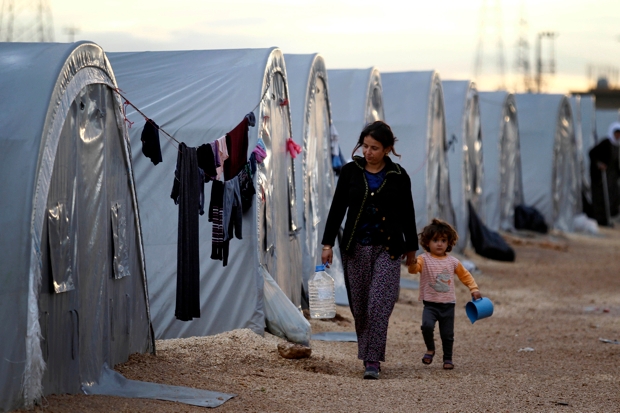I suppose it should not be a surprise that the virtue signalling over the appalling plight of Syrian refugees displaced by that country’s monstrous civil war has now reached fresh heights of absurdity. Nor that some of the press coverage of this dreadful crisis is edging towards a post-Diana level of mawkishness. One front page this morning shouts at David Cameron, demanding the Prime Minister SHOW YOUR HUMANITY. I mean, really.
Then, on ITV’s Murnaghan programme this morning, Nicola Sturgeon and Yvette Cooper were asked if they would house Syrian refugees in their own homes. Obviously they had to say yes and we may now expect the same question to be asked of every politician in Britain. If it’s good enough for Nicola and Yvette – and Bob Geldof – then why isn’t it good enough for you? Show some humanity, damnit. Don’t be such a heartless bastard.
Can we agree this is ridiculous? True, nothing says I’m a pretty decent kind of person better than scribbling #RefugeesWelcome on a piece of paper and then posing for a selfie and posting said selfie on Twitter or Facebook. Twibbons are so yesterday, don’t you know?
I don’t doubt the sincerity of many of the people behaving in this fashion. No-one with even an ordinary measure of compassion can fail to be moved by the plight of these poor Syrians. If you were in their position you’d try anything to get out too.
But let’s at least try and recall the scale of the problem. Nicola Sturgeon says that Scotland – the most compassionate wee country on earth, of course – will welcome 1,000 refugees. A million pounds will be spent to help agencies prepare for any such programme. It’s a start, I suppose, in the same way as draining the North Sea with a jam jar is a beginning. But there are four million displaced persons, uprooted by the chaos in Syria and now living outside their native land.
Sure, doing something is better than doing nothing and every relief effort starts with a single refugee. But, still, even David Cameron’s willingness to accept 15,000 Syrian refugees, chosen from those encamped in Lebanon, Jordan and Turkey, is only a gesture. A better gesture than those offered a week ago, perhaps, but still just a gesture.
Not that anyone else has a very much better idea. Even the Germans’ notion of a europe-wide resettlement programme, with each EU member accepting its allotted quota of refugees mistakes a sticking plaster for a tourniquet.
Tone matters, of course, and the British government misjudged the tone last week. This country (Britain, that is) has in the past offered sanctuary to significant numbers of persecuted and displaced peoples. But there is always more that could be done and a limit to what the people will accept being done.
Posing, as our politicians are now wont to do, cannot disguise this reality. For how long are they prepared to host a family of Syrian refugees in their own property? Six weeks? Six months? Six years? Oh, I see, when you put it like that it becomes a little different. Well of course it does. What may be ideal is not the same as what may be practical.
British government policy may not be ideal but, actually, it’s more practical than most of the ploys dreamt up by the idealists. One way or another, it’s quite easy to recognise that only, perhaps, the United States and Germany have done more than the United Kingdom in this present crisis. A billion pounds spent where the money is most needed – in the middle east – is something that merits more than the derision it has received. Could more be spent? Of course it could. Should it? Undoubtedly. Cash, cold, hard, cash counts.
Even this is just a coping mechanism more than any kind of longer-term solution but it is at least one designed to help the maximum number of people – the ones we don’t see so often on the front pages of the newspapers or on the television news – rather than those who, by luck or desperation, have made it to europe. Because most Syrian refugees cannot make it to europe.
The camps are unsatisfactory too. But what (plausible) alternatives are there? Again, there are four million displaced people. I’m more sympathetic than most people to the idea of a world without borders but I recognise this is a minority tendency. Policy has to be crafted with at least half an eye on what the public will wear. And they won’t wear open borders.
Not even in Britain, a country which, in general, is more liberal and more relaxed about immigration than any other country in europe. Yes, there is UKIP and so on but the British equivalents of the Swedish Democrats, the True Finns, the Front National, or the right-wing populist parties in Austria and Hungary have failed to capture parliament. In the present garment-rending climate this is something important and something to remember.
The world is not as we would arrange it but that does not absolve us of a responsibility to try and improve it, even if only in modest ways. Nevertheless, the grim fact of the issue is that Syria’s agony can only be ended when one side – it may not matter very much which – eventually prevails in its civil war. Only when Syria ceases to be a charnel-house can the agonies of its people be reduced.
Even then, it may be that Syria swaps one appalling dilemma for another. Realpolitik is never a cheery business but the fact remains that, as far as the outside world, particularly whatever constitutes ‘the west’ these days, is concerned there is no ‘good’ outcome to this war. Whatever follows may prove worse than even this. Bloodily distasteful as it is to contemplate, a status quo in which no side can prevail may not be, considered from 40,000 feet, the worst available outcome. The consequences of any side winning are liable to be grim too.
That’s hardly an agreeable thought and it does nothing to diminish a collective requirement to do what can be done to help those suffering most. We can, as I say, do more and we should do so too. But we should also be realistic enough to know that mere virtue signalling is both hopelessly inadequate and disagreeably narcissistic. This is so even when it is meant earnestly.
1,000, 10,000, 50,000, even 100,000. None is enough, not nearly enough, and not likely possible either. So the solution – or, rather, the coping mechanism – must come elsewhere. We do what we can even as we recognise the limits of what we can do. It’s not enough to make anyone feel good about themselves but if that’s what’s important then I suggest your view of what is important is mistaken.







Comments